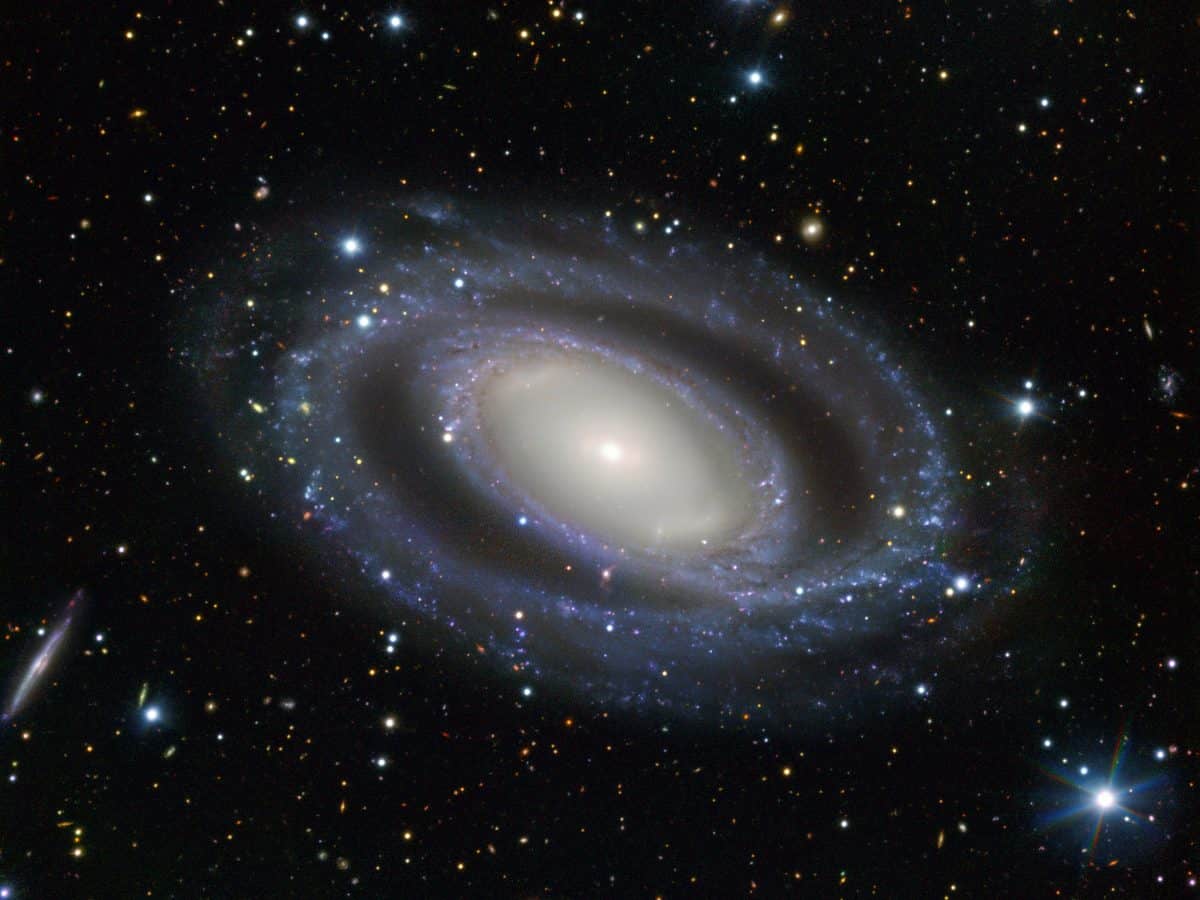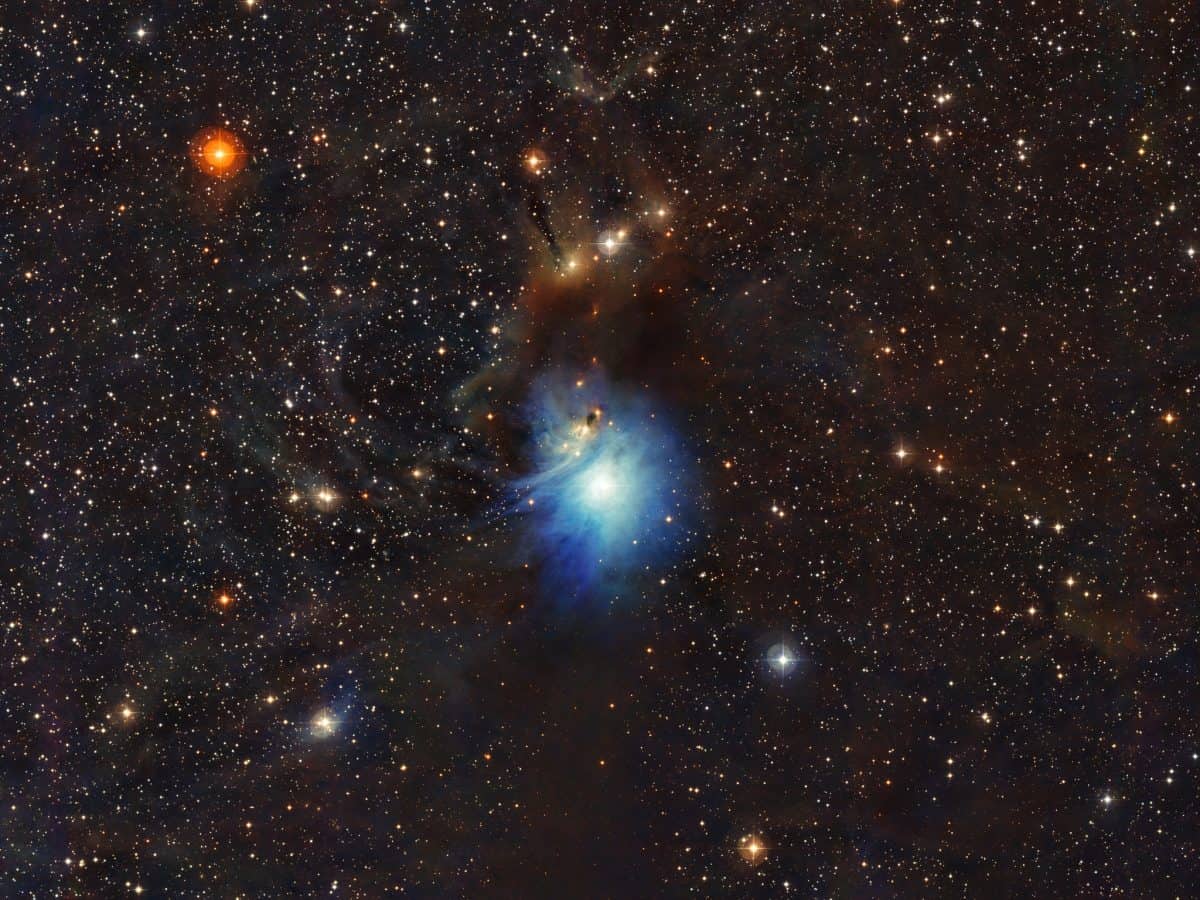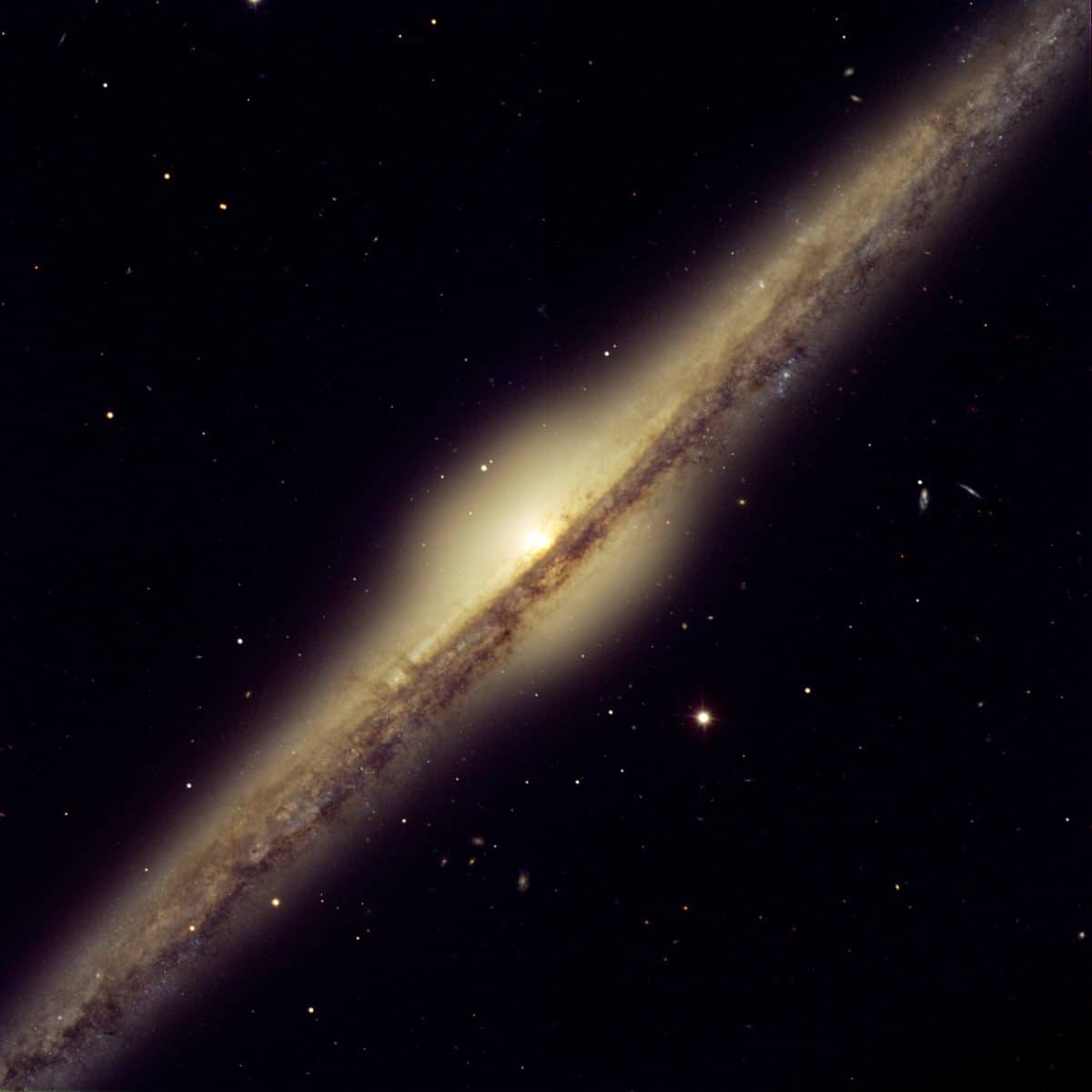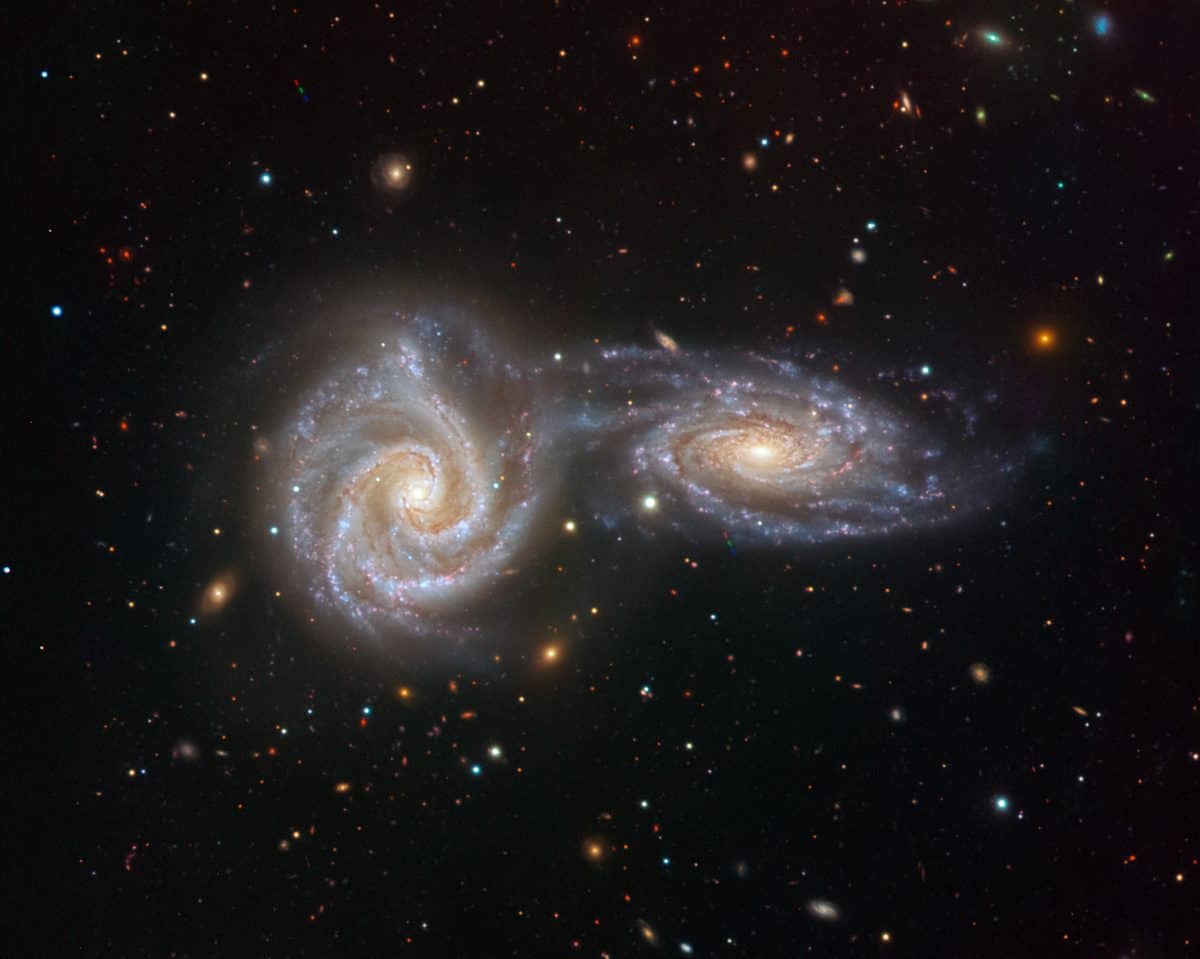Blog
Approximately 95 million light-years away, in the southern constellation of Octans (The Octant), lies NGC 7098 — an intriguing spiral galaxy with numerous sets of double features. The first of NGC 7098’s double features is a duo of distinct ring-like structures that loop around the galaxy’s hazy heart. These are NGC 7098’s spiral arms, which have wound themselves around the galaxy’s luminous core. This central region hosts a second double feature: a double bar.
NGC 7098 has also developed features known as ansae, visible as small, bright streaks at each end of the central region. Ansae are visible areas of overdensity — they commonly take looping, linear, or circular shapes, and can be found at the extremities of planetary ring systems, in nebulous clouds, and, as is the case with NGC 7098, in parts of galaxies that are packed to the brim with stars.
This image is formed from data gathered by the FOcal Reducer and low dispersion Spectrograph (FORS) instrument, installed on ESO’s Very Large Telescope at Paranal Observatory. An array of distant galaxies are also visible throughout the frame, the most prominent being the small, edge-on, spiral galaxy visible to the left of NGC 7098, known as ESO 048-G007.
more...Geoffrey Arnold Beck (born 24 June 1944) is an English rock guitarist. He is one of the three noted guitarists to have played with The Yardbirds (the other two being Eric Clapton and Jimmy Page). Beck also formed The Jeff Beck Group and with Tim Bogert and Carmine Appice, he formed Beck, Bogert & Appice.
Much of Beck’s recorded output has been instrumental, with a focus on innovative sound, and his releases have spanned genre ranging from blues rock, hard rock, and an additional blend of guitar-rock and electronica. Although he recorded two hit albums (in 1975 and 1976) as a solo act, Beck has not established or maintained the sustained commercial success of many of his contemporaries and bandmates. Beck appears on albums by Rod Stewart, Mick Jagger, Tina Turner, Morrissey, Donovan, Diana Ross, Jon Bon Jovi, Malcolm McLaren, Kate Bush, Roger Waters, Stevie Wonder, Les Paul, Zucchero, Cyndi Lauper, Brian May, Roger Taylor, Stanley Clarke, Screaming Lord Sutch, ZZ Top, and Toots and the Maytals.
more...Lester B. Williams (June 24, 1920 – November 13, 1990) was an American Texas blues and electric blues guitarist, singer and songwriter. He is best known for his song “Winter Time Blues” and “I Can’t Lose with the Stuff I Use”. His main influence was T-Bone Walker.
Williams released several singles in the 1950s. His recording career lasted from 1949 to 1956, but he remained a stalwart of the Houston blues circuit for decades.
Williams was born in Groveton, Texas. When he was a young boy his family relocated to Houston. After serving in World War II, Williams sang at Houston’s Eldorado Ballroom, but quit and enrolled at the New England Conservatory in Boston, Massachusetts, to study piano and voice. He did not graduate, and he returned to Houston, where he taught himself to play the guitar and started to write songs. Walker’s influence inspired Williams, who said to himself, “I could learn to play guitar and pull in some of that money that T-Bone made”. Having formed his own group in 1949, he wrote “Winter Time Blues”, which came from his own experience when his wife and daughter traveled to Los Angeles for the summer, leaving him to contemplate the winter alone. The song included the lyric “Winter without your baby, you might as well be dead”.
more...Terrence Mitchell “Terry” Riley (/ˈraɪli/; born June 24, 1935) is an American composer and performing musician associated with the minimalistschool of Western classical music, of which he was a pioneer. His work is deeply influenced by both jazz and Indian classical music, and has utilized innovative tape music techniques and delay systems. He is best known for works such as his 1964 composition In C and 1969 album A Rainbow in Curved Air, both considered landmarks of minimalist music.
Born in Colfax, California in 1935, Riley studied at Shasta College, San Francisco State University, and the San Francisco Conservatory before earning an MA in composition at the University of California, Berkeley, studying with Seymour Shifrin and Robert Erickson. He was involved in the experimental San Francisco Tape Music Center, working with Morton Subotnick, Steve Reich, Pauline Oliveros, and Ramon Sender. His most influential teacher, however, was Pandit Pran Nath (1918–1996), a master of Indian classical voice who also taught La Monte Young and Marian Zazeela. Riley made numerous trips to India over the course of their association to study and to accompany him on tabla, tambura, and voice. Throughout the 1960s he traveled frequently around Europe as well, taking in musical influences and supporting himself by playing in piano bars, until he joined the Mills College faculty in 1971 to teach Indian classical music. He was awarded an Honorary Doctorate Degree in Music at Chapman University in 2007.
Aside from his wonderful singing voice, his great gift was as a band leader and musical arranger. His arrangements were totally new within the context of Middle Eastern music, with the needs of the dancer totally in mind, thus he pioneered something new and accessible to the American audiences that were coming to the shows. He brought this music out from the weddings and haflas and into the clubs. Another very important detail was the role of the dancer as an essential contribution to the musical ensemble, and not simply as a decorative ornament. I feel in this context the dancer was part of a band, which was very different in America previously, where belly dancing was to be seen mostly as Burlesque, with completely unrelated music, or a worse environment – Hollywood movies. I believe he helped bring belly dancing to an appreciative art-form and changed its image by being faithful to it, without removing the sensuality from it, or disguising it with colorful genre terminology such as “Goddess Dance” or “American Tribal” sub-divisions that thankfully, didn’t exist in those days drawing boundaries. If this was all he ever did for the art-form, his contribution is huge.
more...Geoffrey Oryema (16 April 1953 – 22 June 2018) was an Ugandan musician. In 1977 after the murder of his father, Erinayo Wilson Oryema, who was a cabinet minister in the government of Amin he began his life in exile. At the age of 24, and at the height of Idi Amin’s power, Oryema was smuggled across the Ugandan border in the trunk of a car.
He sang in the languages of his youth, Swahili and Acholi, the languages of the lost country, the ‘clear green land’ of Uganda, and he also sang in English and French.
https://www.newvision.co.ug/new_vision/news/1480259/ugandan-world-musician-geoffrey-oryema-dead
more...A newly formed star lights up the surrounding cosmic clouds in this image from ESO’s La Silla Observatory in Chile. Dust particles in the vast clouds that surround the star HD 97300 diffuse its light, like a car headlight in enveloping fog, and create the reflection nebula IC 2631. Although HD 97300 is in the spotlight for now, the very dust that makes it so hard to miss heralds the birth of additional, potentially scene-stealing, future stars.
IC 2631 (also known as Ced 112) is a reflection nebula in the southern constellation Chameleon . The nebula was discovered by the astronomer DeLisle Stewart in 1900 during a stay in Peru and later listed by Johan Ludvig Emil Dreyer in his index catalog .
The reflection nebula IC 2631 is 520 light-years from Earth and the brightest part of the chameleon cloud, a molecular cloud that creates star-forming phenomena and hosts low-mass stars. This cloud is of great importance in studying the formation of planets and brown dwarfs . The star responsible for illuminating towards the IC 2631 is the young star HD 97300. He is a T Tauri star with infrared emissions, to the point where he received the initials Ced 112 IRS Has. This star is part of the group Chamaeleon T1, a group of T-Tauri stars, and is physically bound in the Chamaeleon cloud in which it was formed. This cloud, which forms the northernmost portion of the chameleon cloud, is the one that shows the greater star-forming activity embedded in the entire system to which it belongs.
more...
George Allen Russell (June 23, 1923 – July 27, 2009) was an American jazz pianist, composer, arranger and theorist. He is considered one of the first jazz musicians to contribute to general music theory with a theory of harmony based on jazz rather than European music, in his book Lydian Chromatic Concept of Tonal Organization (1953).
Russell was born in Cincinnati, Ohio to a white father and a black mother, later the adopted only child of a nurse and a chef on the B & O Railroad, Bessie and Joseph Russell. Young Russell sang in the choir of the African Methodist Episcopal Church and listened to the Kentucky Riverboat music of Fate Marable. He made his stage debut at age seven, singing “Moon Over Miami” with Fats Waller.
https://www.youtube.com/watch?v=7f5Mqenq2Fc
more...Milton John “Milt” Hinton (June 23, 1910 – December 19, 2000), regarded as the Dean of jazz bass players, was an American double bassist and photographer. His nicknames included “Sporty” from his years in Chicago, “Fump” from his time on the road with Cab Calloway, and “The Judge” from the 1950s and beyond.
Hinton was born in Vicksburg, Mississippi, the only child of Hilda Gertrude Robinson, whom he referred to as “Titter,” and Milton Dixon Hinton. He was three-months-old when his father left the family. He grew up in a home with his mother, his maternal grandmother (whom he referred to as “Mama”), and two of his mother’s sisters.
more...Mustapha Tettey Addy was born in 1942 in a small village near Ghana’s capital Accra. The Addy family was known for their impressive ritual drummers and so Mustapha learned to play the drum from early childhood. He first performed outside of Ghana in 1964, when he toured several eastern European countries. Since then he has been a frequent traveler to Western Europe, specially to Germany. He also toured in the UK and the United States with various groups (e.g. Ehimomo) and led many workshops, especially at Die Werkstatt in Dusseldorf.
more...https://www.youtube.com/watch?v=usBOyi2MVRU&list=PLEB3LPVcGcWZ0hsQ5_jgSMhawAnDzy1io&index=3
more...NGC 4565, which for obvious reasons is also called the Needle Galaxy. First spotted in 1785 by Uranus’ discoverer, Sir William Herschel (1738-1822), this is one of the most famous example of an edge-on spiral galaxy and is located some 30 million light-years away in the constellation Coma Berenices (Berenice’s Hair). It displays a bright yellowish central bulge that juts out above most impressive dust lanes.
Because it is relatively close (it is only 12 times farther away than Messier 31, the Andromeda galaxy, which is the major galaxy closest to us) and relatively large (roughly one third larger than the Milky Way), it does not fit entirely into the field of view of the FORS instrument (about 7 x 7 arcmin2).
Many background galaxies are also visible in this FORS image, giving full meaning to their nickname of “island universes”.
more...Kristoffer Kristofferson (born June 22, 1936) is an American singer-songwriter, musician, and actor. He wrote and recorded the songs “Me and Bobby McGee“, “For the Good Times“, “Sunday Mornin’ Comin’ Down“, and “Help Me Make It Through the Night“. Kristofferson composed his own songs and collaborated with Nashville songwriters such as Shel Silverstein. In 1985, Kristofferson joined fellow country artists Waylon Jennings, Willie Nelson, and Johnny Cash in forming the country music supergroup The Highwaymen, and formed a key creative force in the Outlaw countrymusic movement that eschewed the Nashville music machine in favor of independent songwriting and producing. In 2004, Kristofferson was inducted into the Country Music Hall of Fame. He is also known for his starring roles in Alice Doesn’t Live Here Anymore, Heaven’s Gate, and A Star Is Born, the latter of which earned him a Golden Globe Award for Best Actor.
Kristoffer Kristofferson was born in Brownsville, Texas, to Mary Ann (née Ashbrook) and Lars Henry Kristofferson, a U.S. Army Air Corps officer (later a U.S. Air Force Major General).
more...Raymond Mantilla (born June 22, 1934) is an American jazz drummer. He has played as a session musician and toured with some of the most significant jazz musicians of his time. Mantilla has been a bandleader of his own ensembles and was a founding member of the percussion ensemble M’Boom with Max Roach.
Mantilla played in New York from the 1950s, inspired by Afro-Cuban jazz. He played with a number of latin jazz ensembles in the 1950s, including the La Playa Sextet, Xavier Cugat, Lou Perez, René Touzet, Miguelito Valdez, and Monguito Conjunto. He played behind Eartha Kitt in 1955. In 1960 he toured with Herbie Mann and recorded with Max Roach. He recorded with Al Cohn in 1961, and recorded with Freddie Hubbard, Buddy Rich, and Larry Coryell in the 1960s. From 1963 to 1969 Mantilla led his own band in Puerto Rico, and in 1970 joined forces with Max Roach’s percussion ensemble, M’Boom.
more...Cal. Green. (CALVIN HENRY GREEN) Born June 22, 1935 Died July 6, 2004
Texan Cal Green was a talented and versatile guitarist who started out imitating his favourite local Blues players, then got a gig playing with one of the biggest R&B acts of the 50s, co-wrote a worldwide hit, then switched to Jazz in the 60s but returned to the Blues in later life.
Cal was born in Dayton Texas in 1937 and in the early days he would copy the guitar style of his hero Clarence ‘Gatemouth’ Brown while his classmate Roy Gaines would copy T-Bone Walkeras the kids would imitate the ‘cutting contests’ of Chicago club legend.
Cal was skilled enough to be asked to record some tracks with pianist Connie McBooker for the Modern label, but his big break came when Hank Ballard and the Midnighters came to town in 1954. Their guitarist Arthur Porter had just been drafted, so 17-year-old Cal stepped in. He played on all Hank’s big hits after ‘Roll With Me, Henry’ and his catchy solo lines on hits like ‘Tore Up Over You’ and ‘Open Up the Back Door’ led Duke/Federal to release Cal’s double-sided instrumental ‘Big Push’/’Green’s Blues’ and a couple of vocal tracks in 1958.
more...World Music on Flamenco Fridays with
estrella morente, isabel la golondrina, aurora carbonell y solea morente por buleria
more...Two spiral galaxies are locked in a spellbinding, swirling dance in this image from the VIMOS instrument on ESO’s Very Large Telescope (VLT). The two interacting galaxies — NGC 5426 and NGC 5427 — together form an intriguing astronomical object named Arp 271, the subject of this, the final image captured by VIMOS before it was decommissioned on 24 March 2018.
VIMOS — or, in full, the VIsible Multi-Object Spectrograph — was active on the VLT for an impressive 16 years. During that time it helped scientists to uncover the wild early lives of massive galaxies, observe awe-inspiring triple-galaxy interactions, and explore deep cosmic questions such as how the Universe’s most massive galaxies grew so large. Instead of focusing on single objects, VIMOS was able to capture detailed information about hundreds of galaxies at once. This sensitive instrument collected the spectra of tens of thousands of galaxies throughout the Universe, showing how they formed, grew, and evolved.
Arp 271 is framed against a backdrop of distant galaxies in this view, and wisps of bluish gas, dust and young stars can be seen bridging the gap between the two galaxies — a result of their mutual gravitational interaction. Like many astronomical observations, this image looks back in time. Thanks to the vast gulf of space separating the Earth and Arp 271, this image shows how the galaxies looked over 110 million years ago: the amount of time it has taken their light to reach us. This kind of collision and merger is also thought to be the eventual fate of the Milky Way, which scientists believe will undergo a similar interaction with our neighbouring galaxy Andromeda.
more...Eric Scott Reed (born June 21, 1970) is an American jazz pianist and composer. His group Black Note released several albums in the 1990s.
Reed was born in Philadelphia, Pennsylvania. He began playing piano at age two, was playing piano in his minister father’s church by age five, and at age seven began formal study at Philadelphia’s Settlement Music School. At age 11 his family moved to Los Angeles, and he studied at the R. D. Colburn School of Arts.
In May 1986, at Colburn School, Reed met Wynton Marsalis, an encounter that would greatly aid his career. At age 18, during a year of college at California State University, Northridge, Reed briefly toured with Marsalis. He joined Marsalis’s septet a year later, and worked with him from 1990 to 1991 (in 1991–1992 he worked with Joe Henderson and Freddie Hubbard), and again from 1992 to 1995. He later worked with the Lincoln Center Jazz Orchestra for two years (1996–1998), and led his own group in 1999.
more...More Posts
- World Music with the Gloaming
- Daily Roots with Carlton and the Shoes
- The Cosmos with NGC 2392
- Shahin Alavi Day
- Bill Doggett Day
- Machito Day
- World Music with Zedashe
- Daily Roots with The Abyssinians
- The Cosmos with NGC 3372
- Melissa Manchester Day
- Nathan Davis Day
- Kirk Lightsey Day
- Kokomo Arnold Day
- World Music with Orlando Julius
- Daily Roots with the Basses
- Happy Valentines Day 2020
- The Cosmos with IC1805 Heart Nebula
- Merl Saunders Day
- Magic Sam Day
- Dwike Mitchell Day



